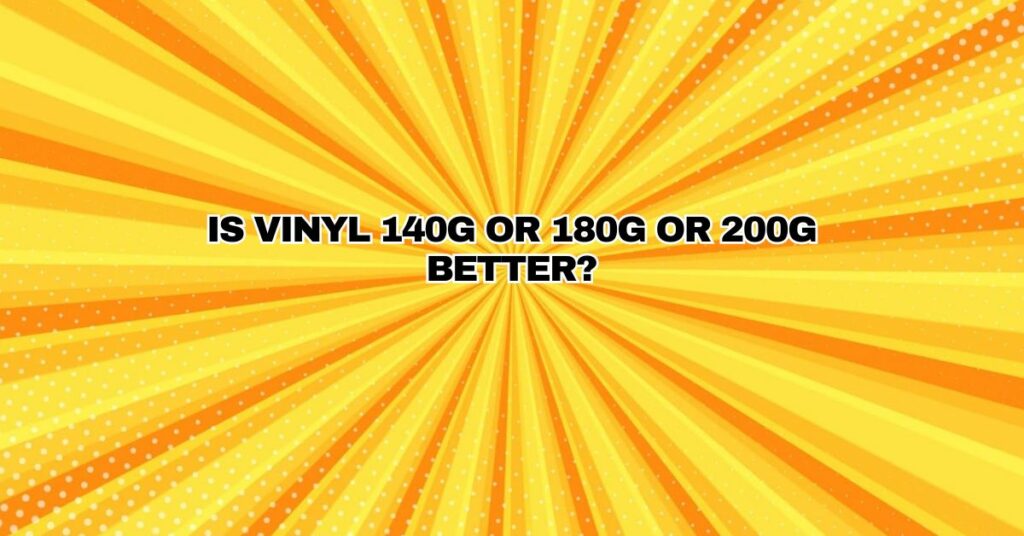Vinyl records have made a remarkable comeback in recent years, captivating both seasoned audiophiles and a new generation of music enthusiasts. As vinyl continues to flourish, so does the debate surrounding the weight of these records. Many argue that heavier vinyl, particularly 180-gram and 200-gram variants, offers superior sound quality, while others maintain that the difference is negligible. In this comprehensive article, we will explore the world of vinyl weights, dissect their impact on sound quality, and help you navigate the question: Is 140g, 180g, or 200g vinyl truly better for audiophiles and music lovers?
Understanding the Essence of Vinyl Records
Before we delve into the intricacies of vinyl weights, it’s vital to grasp the basic elements of a vinyl record. A vinyl record is a circular disc crafted from polyvinyl chloride (PVC). Music is engraved onto the record’s surface in the form of grooves. When a turntable’s stylus or needle traverses these grooves, it translates the physical vibrations into audible sound, delivering a unique analog listening experience that has captivated music enthusiasts for generations.
The Evolution of Vinyl Weights
The history of vinyl records is marked by the evolution of formats and materials used for recording and playback. In the early 20th century, shellac records were the standard, known for their fragility and weight. However, the introduction of the 33 1/3 RPM long-playing (LP) record and the 45 RPM single revolutionized the music industry.
Early vinyl records were relatively thin, typically weighing around 120-140 grams. These records were more susceptible to warping and potential damage due to their lighter build. As technology advanced, record labels began experimenting with heavier vinyl records, ultimately leading to the emergence of 180-gram and 200-gram variants.
Deciphering the Significance of Vinyl Weight
The weight of a vinyl record can have several implications for the listening experience. Here are key factors to consider:
- Durability: One of the primary advantages of heavier vinyl records is enhanced durability. The added thickness and weight make these records less prone to warping and damage, making them more robust and resilient.
- Stability: Heavier vinyl records provide a more stable platform for the grooves. This stability reduces the risk of vibrations and resonances that can detract from sound quality.
- Sound Quality: Vinyl record weight can influence sound quality. Thicker, heavier vinyl records are often less susceptible to surface noise, including pops and crackles, which are commonly associated with vinyl playback. The increased mass also helps maintain consistent playback speed.
- Collectibility: Heavier vinyl records are often associated with special editions, reissues, and audiophile releases. These heavyweight records signify an emphasis on quality and are more attractive to collectors. Additionally, the packaging of heavyweight vinyl records is typically more luxurious, enhancing their collectibility.
Sound Quality and Other Influential Factors
While vinyl record weight significantly influences sound quality, it’s crucial to acknowledge that several other factors also contribute to the listening experience:
- Mastering and Pressing Quality: The quality of mastering and pressing is pivotal in determining sound quality. A well-mastered and well-pressed standard-weight vinyl record can still deliver excellent sound quality. Attention to detail in these processes is essential to preserving audio fidelity.
- Playback Equipment: The quality of the turntable, cartridge, and stylus significantly impacts sound quality. High-quality components can extract more detail from the vinyl grooves, ensuring optimal playback.
- Original Source: The source material used for vinyl pressing plays a substantial role. If the original source was digital, it might introduce digital traits to the final sound. Analog sources can maintain a warmer and more organic sound.
Selecting the Ideal Vinyl Weight: 140g, 180g, or 200g?
The choice of the ideal vinyl weight is ultimately a matter of personal preference and priorities. Each weight option has its merits and limitations, and your selection should align with your goals and listening habits. Consider the following factors when deciding which weight is best for your vinyl collection:
- Sound Quality: If you prioritize pristine sound quality and are willing to invest in high-end playback equipment, heavier vinyl records, such as 180g or 200g, may offer a slight advantage in terms of reduced surface noise and enhanced stability.
- Collectibility: If you are a collector and appreciate the aesthetics and tactile experience of vinyl records, heavier vinyl releases often come with more elaborate packaging and can be valuable additions to your collection.
- Budget and Availability: It’s essential to consider your budget and the availability of vinyl releases in different weights. While heavyweight vinyl may offer some benefits, it can also come at a higher cost.
- Playback Equipment: The quality of your turntable and cartridge should align with your vinyl weight preference. High-quality playback equipment can better extract the subtle nuances offered by heavier records.
- Personal Taste: The best vinyl weight for your collection should align with your personal taste and listening habits. If you enjoy the tactile and visual aspects of vinyl, collectibility, and the warm analog sound, the weight of the record can be a part of that experience.
The Verdict: Is 140g, 180g, or 200g Vinyl Better?
In conclusion, the debate over the superiority of different vinyl weights is multifaceted and doesn’t provide a one-size-fits-all answer. The choice between standard-weight (140g) and heavyweight vinyl records (180g or 200g) ultimately depends on personal preferences, listening habits, and budget considerations.
While heavier vinyl records offer advantages in terms of durability, stability, and reduced surface noise, the difference may be subtle and, for some, not worth the additional cost. The listening experience with vinyl encompasses many elements, including mastering and pressing quality, playback equipment, and the original source material.
The joy of vinyl goes beyond its weight; it’s about the unique connection to music, the tactile experience, and the appreciation of analog sound. Whether you choose a classic standard-weight record or a heavyweight audiophile release, the love for vinyl records remains a testament to the enduring appeal of analog audio in the digital age.

